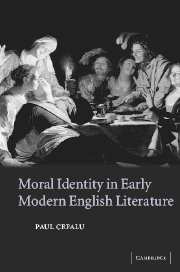Book contents
- Frontmatter
- Contents
- Acknowledgments
- Introduction: English Protestant moral theory and regeneration
- Chapter 1 Shame, guilt, and moral character in early modern English Protestant theology and Sir Philip Sidney's Countess of Pembroke's Arcadia
- Chapter 2 The three orders of nature, grace, and law in Edmund Spenser's The Faerie Queene, Book II
- Chapter 3 Conformist and puritan moral theory: from Richard Hooker's natural law theory to Richard Sibbes's ethical occasionalism
- Chapter 4 The elect body in pain: Godly fear and sanctification in John Donne's poetry and prose
- Chapter 5 Absent neighbors in George Herbert's “The Church,” or Why Agape becomes Caritas in English Protestant devotional poetry
- Chapter 6 Moral pragmatism in the theology of John Milton and his contemporaries
- Epilogue: theorizing early modern moral selfhood
- Notes
- Index
Epilogue: theorizing early modern moral selfhood
Published online by Cambridge University Press: 22 September 2009
- Frontmatter
- Contents
- Acknowledgments
- Introduction: English Protestant moral theory and regeneration
- Chapter 1 Shame, guilt, and moral character in early modern English Protestant theology and Sir Philip Sidney's Countess of Pembroke's Arcadia
- Chapter 2 The three orders of nature, grace, and law in Edmund Spenser's The Faerie Queene, Book II
- Chapter 3 Conformist and puritan moral theory: from Richard Hooker's natural law theory to Richard Sibbes's ethical occasionalism
- Chapter 4 The elect body in pain: Godly fear and sanctification in John Donne's poetry and prose
- Chapter 5 Absent neighbors in George Herbert's “The Church,” or Why Agape becomes Caritas in English Protestant devotional poetry
- Chapter 6 Moral pragmatism in the theology of John Milton and his contemporaries
- Epilogue: theorizing early modern moral selfhood
- Notes
- Index
Summary
We have seen that, regarding the ongoing drama of salvation, early modern literary texts do not directly endorse or critique dogmatic theology as much as test the workings of salvational doctrine in practice. Of course, texts ultimately take positions: Sidney suggests that no prevailing classical humanist or theological view of practical morality is more effective than any other; Spenser implies that reversions to legalism can be effective complements to grace; Donne concludes that filial fear has its unavoidable source in the body; and Milton takes a pragmatic, even Pascalian position on rational-choice optimizing. It would be misleading, however, to say that any of these positions or resolutions is unilaterally tied to any particular early modern theological doctrine.
While we might say that each of these positions is doctrinally syncretistic, a better way to explain the ethical work performed by early modern literature is to say that it offers ad hoc, context-sensitive guidelines for moral behavior rather than universalizable rules of conduct. What motivates all of the ethical guidelines presented in these texts is a desire to locate plausible sources of normativity when direct appeals to godliness for its own sake fail to direct conduct. We have seen that most of these ethical guidelines emerge as a mix of prudentialism and moralism, a mix that often accords a higher weighting to self-interest than it does to expressions of a good will.
- Type
- Chapter
- Information
- Moral Identity in Early Modern English Literature , pp. 189 - 197Publisher: Cambridge University PressPrint publication year: 2004



